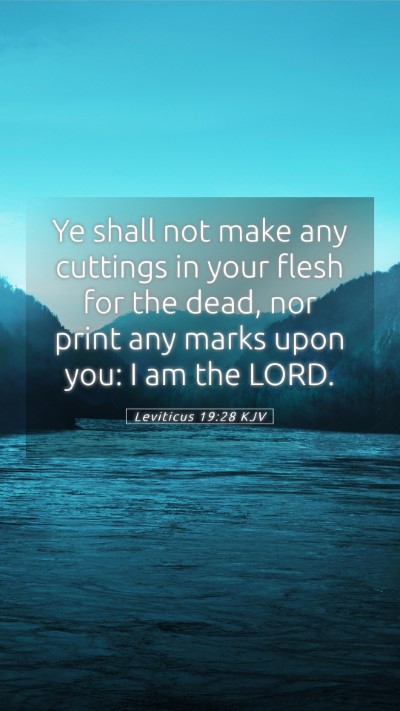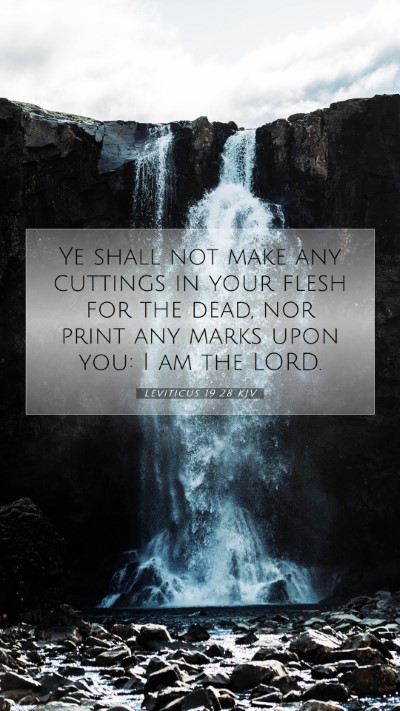Understanding Leviticus 19:28
Bible Verse: Leviticus 19:28 - "You shall not make any cuts on your body for the dead or tattoo yourselves: I am the LORD."
Introduction to Leviticus 19:28
This verse is part of the Levitical laws given to the Israelites, aiming to set them apart as a holy people. The commandments found in Leviticus have profound meanings and applications; thus, understanding Scripture requires careful exegesis and analysis.
Total Overview of Commentary
According to Matthew Henry, this prohibition against tattoos and body cuts is tied to the mourning practices of pagan nations surrounding Israel, emphasizing God's call for His people to maintain a distinct identity reflecting His holiness.
Albert Barnes expands on this by noting that the cultural contexts of ancient rituals often included excessive mourning rituals that God did not wish His followers to adopt. Tattoos, in this case, can symbolize a way of outwardly expressing grief, which is discouraged as it signifies a lack of faith in God's providence.
Adam Clarke elaborates that these physical marks were often associated with idolatrous worship and the dark practices of other nations. He highlights that the regulation serves a purpose of safeguarding the moral integrity of the Israelites.
Symbolism and Purpose
This verse serves as a microcosm for the broader theme of holiness in Leviticus. The intention of the law is not merely to restrict behavior but to foster a deeper relationship with God by abstaining from practices that could compromise that relationship.
Spiritual Implications
Realizing that body modifications for personal expression can often cloud the message of holiness, the verse invites believers today to reflect on how their choices reflect their faith.
Historical Context
In exploring the historical context, it is vital to recognize the influence of surrounding cultures. Israel was called to be a holy nation, distinct from pagan practices. Therefore, the rules concerning body markings and cuts are part of a larger narrative of Israel's covenant relationship with God.
Application to Daily Life
The application of this verse today can vary widely among individuals and communities. It can serve as a reminder to consider the motivations behind one’s actions, particularly those related to body modifications, and how they align with one's faith journey.
Cross References
- Deuteronomy 14:1
- 1 Peter 2:9
- Galatians 5:19-21
- Romans 12:1-2
- 1 Corinthians 6:19-20
Conclusion
Leviticus 19:28 serves as an important verse in understanding the call to holiness among believers. Through various commentaries, we see how this verse not only addresses the physical acts of marking the body but invites a deeper introspection about our identity as God’s chosen people. The essence of biblical verse interpretations encourages a thoughtful engagement with Scripture, providing rich insights for Bible study groups and personal study.
For those exploring the meaning of Bible verses or looking for specific Bible study insights, Leviticus 19:28 provides an excellent case for understanding scripture within its context and applying its principles to modern life.


